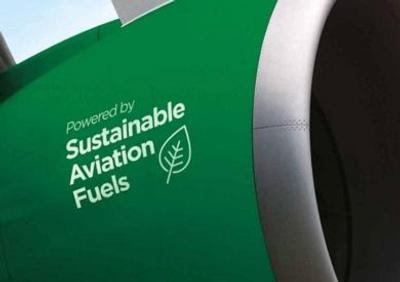Tue, Nov 30, 2021
First Study on Commercial Jet Travel on 100% Sustainable Fuel
A joint study on the impact of 100% sustainable aviation fuel (SAF) on both engines of a commercial jet have shown highly promising results in the early phases of analysis, says Airbus. Working with fellow industry veterans Rolls-Royce, fuel production specialist Neste, and German Research Centre DLR, the test is the first time that both engines of a commercial passenger aircraft have been run on 100% sustainable fuel, a departure from the norm.

The study focuses on the in-flight emissions on the Airbus A350 and its Rolls-Royce Trent XWB engines. Associated ground testing began in early 2021 and has continued with expansion to the program. Additional research publications are expected from the National Research Council of Canada and the University of Manchester towards the end of 2022. The program comes during a widespread push for SAF to bridge the gap between aircraft in service and futuristic, currently hypothetical electric passenger aircraft. Previous studies in the same program tested the results of mixtures up to 50% of newer, greener options, paving the way for today's promising efforts.
The lower density, but higher energy content per pound of SAF compared to conventional kerosene brings some efficiency improvements through lower fuel burn and less needed fuel weight for the same mission, according to the preliminary results. Thus far, the fuel change has shown little negative impact on the engines, both on the ground and in the air, said Simon Burr of Rolls-Royce. Throughout the testing, a chaser DLR Falcon followed the testbed with a full suite of measurement equipment to evaluate emissions during the flight.

“Engines and fuel systems can be tested on the ground but the only way to gather the full set of emissions data necessary for this program to be successful is to fly an aircraft in real conditions,” said Steven Le Moing, New Energy Program Manager at Airbus. “In-flight testing of the A350 offers the advantage of characterizing direct and indirect engine emissions, including particulates from behind an aircraft at high altitude.”
The campaign will continue, expected to show significant benefits aside from the decreased burn and carbon emissions. Markus Fischer of DLR's Aeronautics Board says the study shows SAF "to have a significantly lower carbon footprint over its life cycle compared to conventional jet fuel." That's not all, he continued: "now we are seeing it is advantageous in reducing non-CO2 effects too. Tests such as these are continuing to develop our understanding of 100% SAF, its use in flight and we are seeing positive signs for its potential in climate mitigation."
More News
Local Airport Advisory (LAA) A service available only in Alaska and provided by facilities that are located on the landing airport, have a discrete ground-to-air communication freq>[...]
Also: Cosmonaut Kicked Out, Airbus Scales Back, AF Silver Star, Russian A-60 Clobbered A Samaritan’s Purse humanitarian flight was hijacked on Tuesday, December 2, while atte>[...]
Aero Linx: Michigan Helicopter Association (MHA) The Michigan Helicopter Association (MHA) exists to bring together people who share an interest in helicopters, including private, >[...]
Also: Airbus Acquisition, USCG Helo Sniper, Remember Pearl Harbor, New Thunderbird 1 Gulfstream’s newest addition to its next-gen lineup, the super-midsize G300, is officiall>[...]
Also: Electra Goes Military, Miami Air Taxi, Hypersonics Lab, MagniX HeliStrom Amazon’s Prime Air drones are back in the spotlight after one of its newest MK30 delivery drone>[...]
 ANN's Daily Aero-Term (12.14.25): Local Airport Advisory (LAA)
ANN's Daily Aero-Term (12.14.25): Local Airport Advisory (LAA) Airborne 12.08.25: Samaritans Purse Hijack, FAA Med Relief, China Rocket Fail
Airborne 12.08.25: Samaritans Purse Hijack, FAA Med Relief, China Rocket Fail ANN's Daily Aero-Linx (12.15.25)
ANN's Daily Aero-Linx (12.15.25) Airborne 12.10.25: New Gulfstream, ATC Integrator, Outrageous FFZ User Fees
Airborne 12.10.25: New Gulfstream, ATC Integrator, Outrageous FFZ User Fees Airborne-NextGen 12.09.25: Amazon Crash, China Rocket Accident, UAV Black Hawk
Airborne-NextGen 12.09.25: Amazon Crash, China Rocket Accident, UAV Black Hawk




